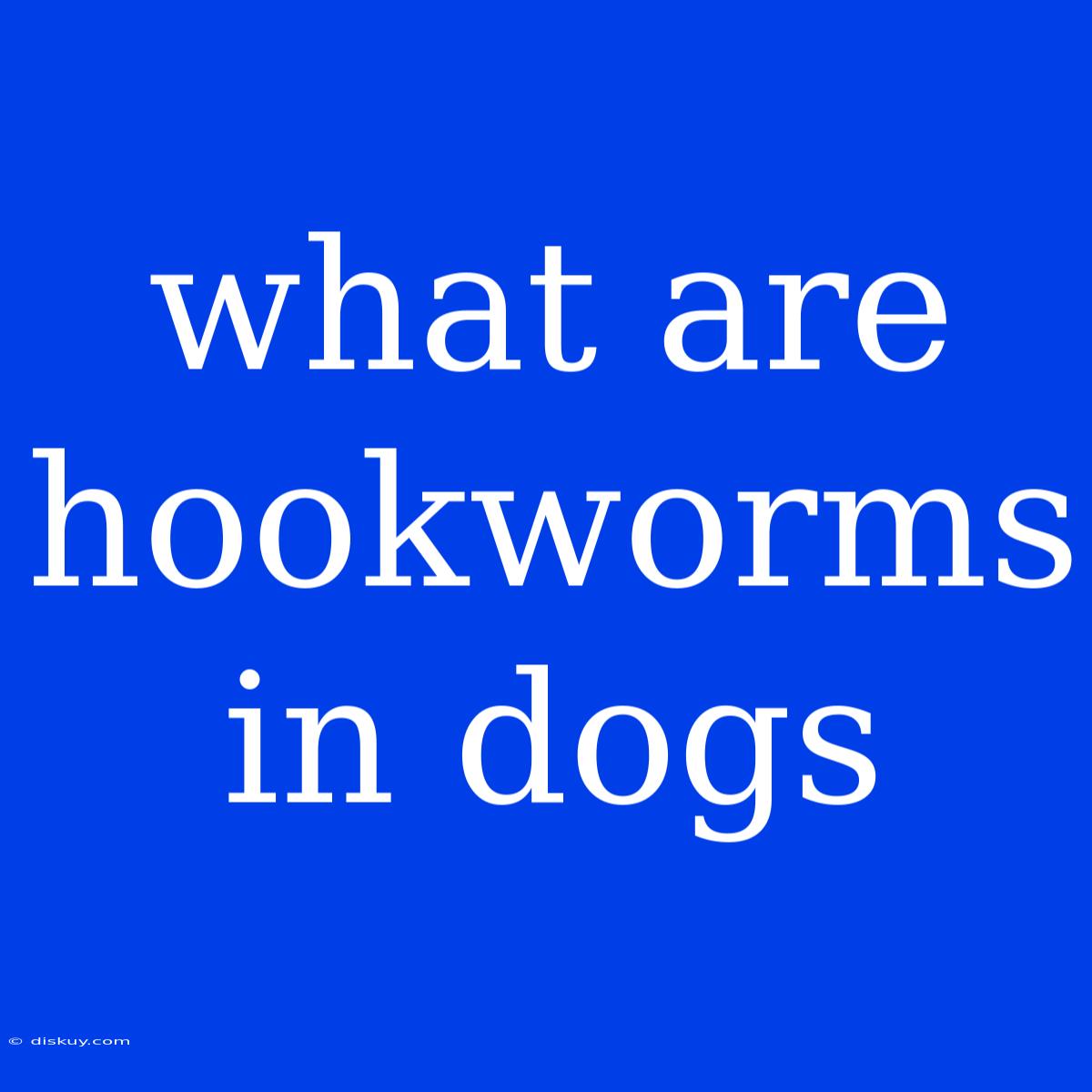Unraveling the Mystery: What Are Hookworms in Dogs?
Can tiny parasites seriously threaten your canine companion? Hookworms in dogs are a common and potentially serious concern for dog owners. Understanding these parasitic invaders is crucial to protecting your furry friend.
Editor Note: This article delves into the world of hookworms, providing insights into their lifecycle, symptoms, prevention, and treatment.
Why Should You Care?
Hookworms are intestinal parasites that can cause severe health problems in dogs, including anemia, lethargy, and even death. Learning about them empowers you to make informed decisions about your dog's health and well-being. This article will explore the intricate details of hookworm infection, helping you recognize the signs and implement preventative measures.
Our Approach:
We have conducted in-depth research, drawing information from reputable veterinary sources and scientific studies to create this comprehensive guide. It's designed to help dog owners understand the nuances of hookworm infection, making informed decisions for their furry companions.
Key Takeaways About Hookworms:
| Key Aspect | Description |
|---|---|
| Types | Ancylostoma caninum and Uncinaria stenocephala are the most common hookworms in dogs. |
| Transmission | Hookworms are spread through infected feces, contaminated soil, and even direct contact with infected dogs. |
| Symptoms | Common signs include diarrhea, weight loss, lethargy, and a dull coat. |
| Diagnosis | A fecal exam by your veterinarian can diagnose hookworm infection. |
| Treatment | Medication prescribed by a veterinarian can effectively treat hookworms. |
| Prevention | Regular deworming, maintaining a clean environment, and avoiding contact with infected dogs are crucial. |
Hookworms: Unveiling the Threat
Understanding the Lifecycle:
Hookworm eggs, shed in the feces of infected dogs, mature into larvae in the environment. These larvae can penetrate the skin, be ingested orally, or travel to the lungs before migrating to the intestines. In the intestines, they mature into adult hookworms, attaching to the intestinal wall and feeding on blood. This process can cause significant blood loss and anemia in infected dogs.
Recognizing the Signs:
- Diarrhea: Hookworms can irritate the intestines, leading to watery or bloody diarrhea.
- Weight Loss: Loss of appetite and the chronic blood loss caused by hookworms can lead to weight loss.
- Lethargy: Infected dogs may appear tired, weak, and unwilling to play.
- Dull Coat: Anemia caused by hookworms can lead to a dull, dry, and pale coat.
- Coughing: In some cases, hookworm larvae migrating to the lungs can cause coughing.
- Pale Gums: Severe anemia can result in pale gums and mucous membranes.
Seeking Professional Help:
If you suspect your dog may have hookworms, it is crucial to contact your veterinarian immediately. They will perform a fecal exam to diagnose the infection and prescribe the appropriate treatment.
Hookworm Prevention: A Proactive Approach
1. Regular Deworming:
Deworming your dog with a broad-spectrum dewormer, as recommended by your veterinarian, is essential for preventing hookworm infections.
2. Environmental Control:
Keep your dog's living environment clean and free of feces. Pick up their droppings promptly and dispose of them properly.
3. Avoid Contaminated Areas:
Avoid exposing your dog to areas known to harbor hookworm larvae, such as parks, beaches, and areas where other dogs have defecated.
4. Wash Hands Thoroughly:
Always wash your hands thoroughly after handling your dog's feces or cleaning their living area.
Hookworm Treatment: Restoring Your Dog's Health
Hookworm infections are treatable with medication prescribed by a veterinarian. The treatment regimen will depend on the severity of the infection and the dog's overall health.
Frequently Asked Questions
Q1: Are hookworms contagious to humans?
While hookworms are most commonly found in dogs, some species can infect humans. However, the risk of human infection is relatively low.
Q2: How long can hookworm larvae survive in the environment?
Hookworm larvae can survive in moist, warm environments for weeks, even months, making environmental control a crucial aspect of prevention.
Q3: What are the long-term effects of hookworm infection?
Untreated hookworm infections can lead to chronic anemia, weight loss, and even death. However, prompt treatment can often restore a dog's health.
Tips for Preventing Hookworm Infections:
- Use a regular deworming schedule: Consult your veterinarian for appropriate deworming intervals for your dog's breed and lifestyle.
- Keep your dog's living area clean: Regularly clean and disinfect areas where your dog sleeps, eats, and plays.
- Minimize exposure to contaminated areas: Avoid dog parks or other public areas where feces are present.
- Wash your hands: Wash your hands thoroughly after handling your dog's feces or cleaning their living area.
- Consider indoor-only living: If possible, keep your dog indoors to reduce their exposure to hookworms.
Summary: A Path to Canine Health
Hookworm infection is a significant threat to your dog's health, but with knowledge and proper precautions, you can protect your furry companion. Understanding the lifecycle, recognizing symptoms, and employing prevention strategies are crucial. By taking a proactive approach, you can help keep your dog healthy and happy.
Closing Message: Empowering dog owners with knowledge about hookworms allows them to make informed decisions about their pets' health. Remember, early detection and prompt treatment are key to ensuring a healthy and happy life for your beloved canine companion.

